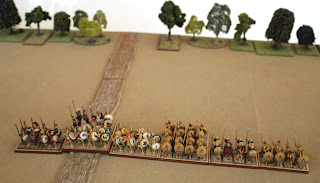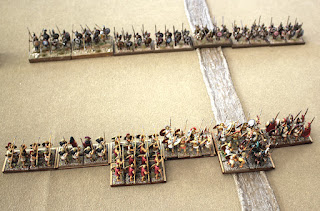 |
| Armies deployed from the Athenian side |
 |
| From the Spartan side |
 |
| Spartans advance |
 |
| 'Alala! rules and QRS |
 |
| Athenian light cavalry shoot |
 |
| Heavy cavalry shoot |
Last Wednesday afternoon Craig came over and we played our first game of 'Alala! with Spartans versus Athenians in the Peloponnesian War. The 'Alala! rules are written by Simon MacDowall, published by the Society of Ancients and are designed for battles between Greek city states during the Peloponnesian and Boeotian Wars of the fifth and fourth centuries BC. The rules are in colour, 24 pages, include a QRS sheet and a God Pack of cards. 'Alala means battle cry in Greek. They use a turn sequence of dicing for Initiative, Command Actions, Control Tests, Skirmish Actions, Phalanx Movement, Charges, Combat and After Combat Moves. Movement is variable with average dice and shooting and combat is resolved with D6 dice. Command and Control is managed by leaders attached to individual hoplite units, who must deal with Disorganisation Points and Causes while trying to raise Agression Levels and Morale.
Craig's Athenians and allies had three leaders, four Class B hoplite units, a heavy and light cavalry unit, a unit of peltasts and three units of psiloi. My Spartans and allies were very similar with three leaders, three Class A Spartan hoplite units, one allied Class B hoplite unit, a heavy and light cavalry unit, a unit of peltasts and two units of psiloi. I had the Initiative for most of the early turns in the game and the Spartans advanced with the psiloi, peltasts and cavalry shooting. The Spartan heavy cavalry and Athenian light cavalry charged on separate flanks, after combat both sides rode through their opponents. After advancing for quite a few turns the Spartan and allied hoplites charged on the flanks and the Spartan hoplites eventually charged in the centre.
Hoplite combat was attritional with hits on 5 and 6 with a maximum of 12 dice and various modifiers including support, Eager, Ready, Disorder Points and Shaken. Results of combat are then worked out depending on the differences in hits for each side. In the end we ran out of time, the Athenian allied hoplite unit on the right was shaken and two Spartan hoplite units in the centre were retiring but a result still seemed a fair way off. I like how these rules are written for a specific period instead of the usual vast 4,000 thousand year time span of most ancient rules. No doubt as a first game we got a few things wrong. They have a number of interesting and innovative features and invoking the God Pack of cards is a lot of fun. Whether you would like them depends a lot on your personal taste in rules and the mechanics used. Personally I'm not a big fan of variable movement with dice and prefer combat where there are modifiers for the quality of troops involved.
 |
| Side view |
 |
Spartan heavy cavalry charge
|
 |
| Athenian light cavalry charge |
 |
| Peltasts charge in the centre |
 |
| Hoplite units charge on the flanks |
 |
Athenian allied hoplites are shaken,
Spartan hoplites retiring in the centre |




























